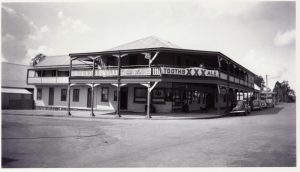One of Australia’s most distinguished journalists, Robert Milliken, who died on May 21 from cancer, was born in Taree and spent the early part of his childhood in Wingham.
His parents and his Aunt Jenny Cross owned and ran the Wingham Hotel, a much loved centre of town at that time. The Crosses had been in Wingham since the 1870’s and Robert’s grandfather, Harry Cross, was a local businessman and hotelier.
At the start of ten o’clock closing the family sold the hotel and moved to a cattle property out of Gloucester. Robert rode his horse to a one-teacher primary school at Rookhurst, and boarded at Scots College for his secondary years, where he became a member of the Scots pipe band.
After school he worked for a year as a copy boy on the Daily Telegraph, then gained an honours degree in political science at the University of NSW, before joining The Sydney Morning Herald in its first all-graduate cadet intake.
From the Herald’s London bureau he covered the Yom Kippur war in 1973, crossing the Suez Canal with the Israeli army, then the civil war that devastated Beirut, and the troubles in Northern Ireland.
Yet he turned away from the dangerous glamour of war reporting and foreign postings to return to look at his own country, in more and more depth, never intruding himself into the foreground. In the 1970’s he worked at the National Times, a weekly in the Fairfax stable which, often to the alarm of conservative management, specialised in hard-hitting investigations. He broke a land scandal which ended the career of Coalition treasurer Phillip Lynch.
In 1979 he won a Knight Journalism Fellowship to Stanford University near San Francisco, joining an elite group of promising journalists from around the world for intensive exposure of big issues.
In the mid-1980s he became Australian correspondent for The Independent of London. Later he moved to the same role with The Economist.
He covered the royal commission under Justice Jim McClelland into the British nuclear tests in Australia, resulting in his 1986 book No Conceivable Injury, a phrase from Robert Menzies’ public assurance the bombs could not possibly do any harm in Australia’s “vast spaces”. The nomadic Aborigines of the plutonium-strewn desert did not count. Then it was the royal commission into Aboriginal deaths in custody, called after the death of 16-year-old John Pat in a violent police arrest in Roebourne, WA.
As a child, he’d been driven past settlements like Purfleet where the Manning’s surviving Aboriginals had been pushed. Now, for the rest of his life he investigated the causes and potential remedies for the atrociously high rate of Aboriginal incarceration.
In 1992 he travelled the regions with photographer Lorrie Graham for their book On the Edge about the struggles of farmers as the economy of the land changed around them.
in 2002, he wrote Mother of Rock, a biography of the Australian journalist, rock music chronicler and feminist Lillian Roxon.
He wrote for the monthly journal Australian Society, and for the website Inside Story. His deep reporting on the atrociously high rate of Aboriginal incarceration was the highlight of his work for Inside Story, says its editor, Peter Browne.

He never lost contact with Wingham. His Milliken uncles owned a small farm out of Nabiac, and Robert eventually took ownership of it and it became a much loved haven from the city where he agisted cattle and brought friends for holidays.
Robert is survived by his sister, film producer Sue Milliken, and his extended Milliken family.
Hamish McDonald
Max Suich
